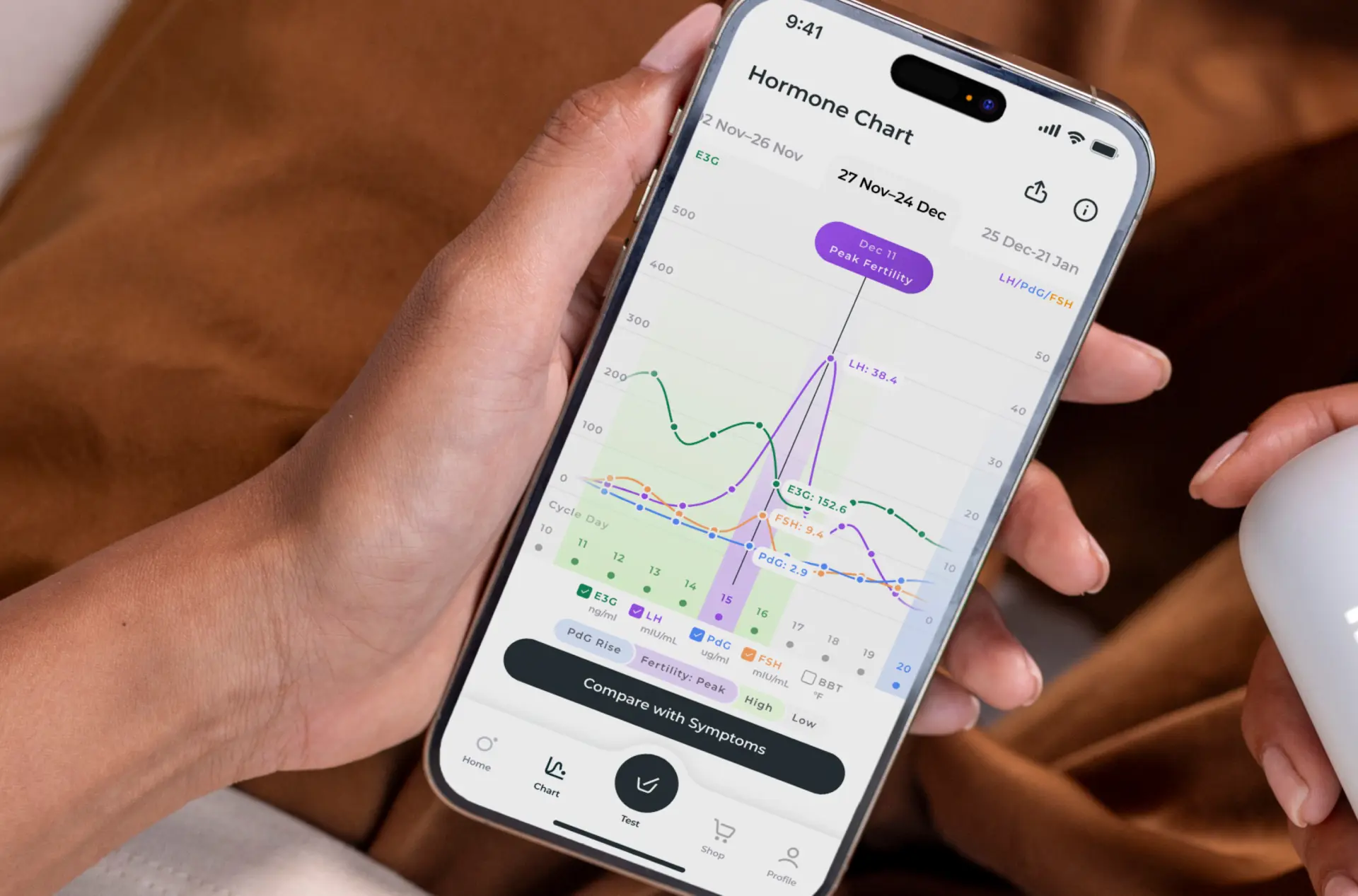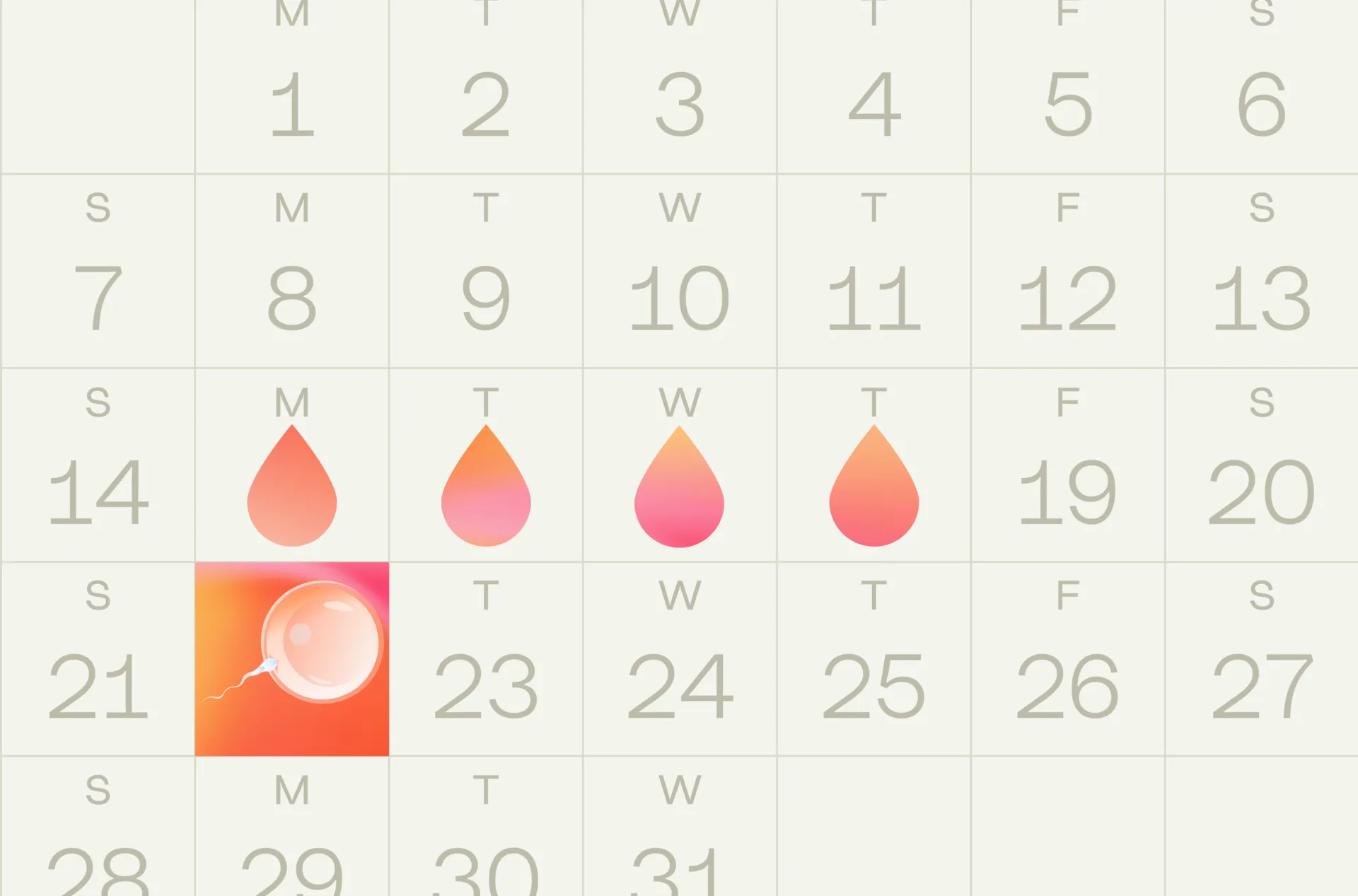Content table
Polycystic Ovary Syndrome (PCOS) affects 6-13% of women worldwide. It’s the #1 reason why women don’t ovulate (anovulation). Up to 95% of women with anovulatory infertility have PCOS.
Fortunately, PCOS is a treatable condition. Medication and lifestyle changes can help improve PCOS and its symptoms. Here’s how.
Key Takeaways
- PCOS is a hormone imbalance where women have fluid-filled sacs called cysts present in their ovaries due to high levels of male hormones.
- Symptoms of PCOS include insulin resistance, acne, facial hair, male-patterned baldness, irregular periods, and infertility.
- There are lots of different treatments for PCOS, depending on your symptoms and goals.
- Lifestyle changes that promote healthy weight loss can improve all aspects of PCOS.
- Birth control pills and anti-androgen drugs help address the hormone imbalance in PCOS.
- The medications clomiphene or letrozole can help bring back regular ovulation.
- Metformin and GLP-1 medications (like Ozempic) can treat insulin resistance.
- Some women can get pregnant after treating PCOS, but others need additional fertility treatments.
How Does PCOS Affect Your Hormones and Health?
PCOS is essentially a hormone imbalance. It causes cysts (or fluid-filled sacs) to develop in your ovaries and leads to irregular periods. PCOS also makes it harder to get pregnant.
PCOS affects fertility in several ways, starting with ovulation. In PCOS, levels of male hormones called androgens are too high, including testosterone. This causes the follicles in your ovaries to remain small. They don’t mature and grow as they normally should.
This can lead to anovulation, where the egg doesn’t get released from the ovary. In this case, you don’t ovulate at all. It can also cause oligoovulation, where ovulation is unpredictable or doesn’t happen as often.
And here’s where Inito can help. The Inito fertility monitor tracks four key fertility hormones on one single test strip. What’s more, Inito measures the urine metabolite of progesterone, PdG, to actually confirm ovulation, so you don’t just need to rely on guesswork.
So what’s the issue with not ovulating?
Without ovulation, there’s no rise in progesterone to counterbalance estrogen levels. This causes problems with the endometrium and interferes with implantation (in some cases, it can raise the risk of endometrial cancer as well).
The hormone imbalance in PCOS also causes irregular periods. Your menstrual cycle may be longer, shorter, heavier, or lighter. You may also skip periods, making it harder to predict when you will ovulate.
Know more: The 8 Types of Abnormal Menstruation You Should Know About
PCOS can also negatively affect egg quality because it can cause disruptions to follicle generation. Molecular defects in the egg cells and high androgen levels may contribute to this alteration in egg development during PCOS.
PCOS also affects your metabolism, causing insulin resistance in 70% of women who have it. Insulin resistance is a sign of prediabetes and type 2 diabetes. Being resistant to insulin leads to high blood sugar levels and low-grade inflammation. It brings extra risks during pregnancy and can damage your health over time.
Insulin resistance may also affect your fertility and ovulation. It affects the liver’s production of a protein called sex hormone–binding globulin (SHBG). Low SHBG levels raise free testosterone, creating a cycle that keeps androgen levels high.
Treatment Options for PCOS Symptoms
Unfortunately, there’s no cure for PCOS yet. But there are lots of treatment options to help control its symptoms and improve your health. Your doctor can recommend different treatments depending on what symptoms are affecting you the most. Here’s how some of the most common PCOS symptoms are usually treated.
Irregular menstrual periods
Between 38% to 88% of women with PCOS have excess body weight. But the good news is that for those with obesity, losing just 5% of total body weight can have positive effects. This modest weight loss helps improve hormones, metabolism, and menstrual cycles.
Aside from healthy weight loss, birth control also helps regulate menstrual cycles for women with PCOS. Combined oral contraceptives that have estrogen and progestin are considered a first-line treatment for PCOS. They get your cycle back on track. They also protect against endometrial cancer.
Usually, the benefits of combined oral contraceptives outweigh the risks for women with PCOS. However, they’re not right for everyone. Your doctor will need to consider your family history, heart health, risk of diabetes, and lifestyle factors (like smoking) before deciding if birth control is safe for you. Additionally, if you’re trying to get pregnant, you would need to look for alternatives.
Low or no ovulation
Since irregular periods and irregular ovulation are two sides of the same coin, again, weight loss is a great approach to jumpstart ovulation.
But if it doesn’t, medications are your next line of treatment. The FDA has approved clomiphene (Clomid®) to treat irregular ovulation.
Clomiphene works by binding to the estrogen receptors in your brain. This blocks your body’s natural estrogen and makes your brain think estrogen levels are low. As a result, it sends signals to make Follicle-Stimulating Hormone (FSH).
FSH stimulates the follicles in the ovaries so that the eggs can grow. Ideally, you’ll end up with at least one egg that’s mature enough to be released and fertilized.
Another medication treatment option is letrozole. Letrozole belongs to a group of drugs called aromatase inhibitors. It works by blocking estrogen production.
A meta-analysis of about 4,000 women found that letrozole was more effective than clomiphene. It was associated with better outcomes for ovulation, pregnancy, and live-birth rates. However, other studies comparing the two treatments have found mixed results. Your healthcare provider will help you decide the best option for you.
Know more: Clomid® vs. Letrozole: A Complete Comparison
Androgen excess
Most women with PCOS (75–90%) have high androgen levels, known as hyperandrogenism.
The main symptoms include acne and hair changes. You may notice more hair growing on your face, chest, and back. This is called hirsutism. Women with high androgens also lose hair on the scalp (male-patterned baldness). Along with reviewing your physical symptoms, your doctor runs a blood test to measure your androgen levels.
The first line of treatment for hirsutism is combined oral contraceptives. These birth control pills work by lowering androgen levels. Birth control also increases SHBG and may improve acne. Treatment usually works within six months. If you don’t see improvements by then, your doctor may recommend antiandrogen therapy, such as the medications spironolactone or finasteride. However, these medications aren’t safe to keep taking if you get pregnant.
Know more: Spironolactone for PCOS: Benefits and Fertility Tips
Eflornithine is FDA-approved for the treatment of unwanted facial hair. But it hasn’t been studied specifically for women with PCOS. Applying eflornithine cream to the face daily slows unwanted hair growth in the area. It works by blocking an enzyme that hair needs to grow.
You can also meet with a dermatologist to find strategies to help with acne and excessive hair growth at home. For example, changing your skincare routine and using hair removal products for body hair can help as you wait for your PCOS treatment to start working.
Insulin resistance
Insulin resistance is related to high androgens and body weight. Fortunately, lifestyle changes and medication can help you lose weight, lower androgens, and improve insulin resistance.
Drugs like metformin can also help. Metformin makes the body more sensitive to insulin, lowering insulin resistance. It also reduces testosterone levels and symptoms like hirsutism and acne. Metformin is safe to take during pregnancy, unlike many other androgen-lowering treatments. Experts recommend metformin for adults with insulin resistance and PCOS.
Know more: Metformin for PCOS: Fertility Benefits You Need to Know
Semaglutide (Ozempic) is another potential treatment option for insulin resistance. In one study, GLP-1 medications like Ozempic offered several benefits for women with PCOS. Treatment improved insulin sensitivity and promoted weight loss, hormonal balance, regular periods, and fertility.
Know more: The Good and the Bad of Ozempic for PCOS
Can I get pregnant with PCOS?
Yes, it’s possible to get pregnant with PCOS, but it can take some extra effort and planning.
Start by making healthy lifestyle changes with regular exercise and a healthy diet. Next, ask your doctor if medications to promote ovulation or lower insulin resistance could improve your chances. If not, you may need to consider more invasive fertility treatments or in vitro fertilization.
Know more: Can You Get Pregnant with PCOS?
If you’re under 35 years old, take some time to manage your PCOS first. You’ll have better odds of a healthy pregnancy, benefiting you and your baby.
But if you’re over 35 and are considering IVF, there’s good news. You’ll have higher chances of success with IVF compared to women with infertility caused by other issues.
If you’re over 35 and don’t want to try fertility treatments, you should still find ways to manage PCOS. Reach out to your doctor to learn how to improve your fertility.
Know more: Best Age to Get Pregnant With PCOS

FAQs
Cysts aren’t considered “dangerous”, but they can be painful. Most ovarian cysts are around the size of a cherry, or 1 to 3 centimeters. They’re usually harmless and go away without treatment. You may not even know you have one. A cyst that’s 15 to 30 centimeters is rare and considered very large. A large cyst may need testing and treatment to reduce discomfort and ensure it’s not cancerous.
PCOS treatment usually involves healthy lifestyle changes and medication. Medication options include birth control pills, diabetes medication, letrozole, spironolactone, or finasteride.
PCOS may lead to a higher risk of:
- Infertility
- Miscarriage
- Endometrial cancer
- Diabetes
- Heart disease
One rare but possible complication of PCOS is called ovarian torsion. If you have a large cyst and make a sudden movement, the ovary may twist around the surrounding tissue. This is painful and can cut off blood flow to the ovary. Emergency surgery is needed to prevent the ovary from dying.
PCOS does not cause bipolar disorder. However, some studies suggest that bipolar disorder is a risk factor for PCOS. One study found higher rates of PCOS in people with bipolar disorder. Hormone fluctuations may affect mood and serve as a link between the two conditions.
There are several treatment options for PCOS. The best medicine for you depends on your symptoms, medical history, and fertility goals. Only your healthcare provider can help you choose the right treatment.
Was this article helpful?
- Polycystic Ovary Syndrome | World Health Organization
- The Role of Polycystic Ovary Syndrome in Reproductive and Metabolic Health: Overview and Approaches for Treatment | American Diabetes Association
- Chronic Low-Grade Inflammation in Polycystic Ovary Syndrome: Is There a (Patho)-Physiological Role for Interleukin-1? | Seminars in Immunopathology
- Oocyte Quality in Adult Polycystic Ovary Syndrome | Seminars in Reproductive Medicine
- Endometrium in PCOS: Implantation and predisposition to endocrine CA | Best Practice & Research. Clinical Endocrinology & Metabolism.
- Why are women with polycystic ovary syndrome obese? | British Medical Bulletin
- Clomiphene | StatPearls
- Letrozole | ScienceDirect
- Letrozole Compared With Clomiphene Citrate for Polycystic Ovarian Syndrome | Obstetrics & Gynecology
- Hyperandrogenism in Women with Polycystic Ovarian Syndrome: Pathophysiology and Controversies | Androgens: Clinical Research and Therapeutics
- Drug Treatments for Polycystic Ovary Syndrome | American Family Physician
- The potential role of incretin-based therapies for polycystic ovary syndrome: a narrative review of the current evidence | Therapeutic Advances in Endocrinology and Metabolism
- Overview: Ovarian cysts | NIH
- Prevalence and characteristics of polycystic ovarian syndrome in patients with bipolar disorder | Journal of Affective Disorders












